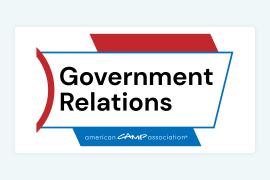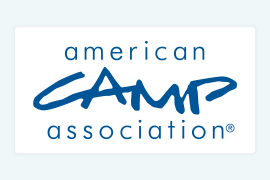|
Updated on March 28, 2018 On Friday, March 23, President Trump signed the omnibus spending package, which included provisions for the Child Protection Improvements Act (CPIA). The new law gives camps access to FBI background checks. Learn more. |
The Bill
- Final version of Omnibus Bill
- Old versions:
- HR 695: Sponsored by Representatives Adam Schiff (CA-29) and Mike Bishop (MI-8) — was introduced on 1/24/2017 and has been referred to the House Committee on the Judiciary. House of Representatives Judiciary Committee UNANIMOUSLY passed the Child Protection Improvements Act (HR 695) on 3/22/2017. PASSED BY THE HOUSE on MAY 22, 2017! Learn More
- S.705: Sponsored by Senator Orrin Hatch (UT) and Al Franken (MN) - was introduced 3/23/2017 and has passed through the Senate on 10/16/2017. Learn More
- In the 111th Congress, this bipartisan bill passed through the House of Representatives by a vote of 412–4. In the 112th Congress, this bill passed through the Senate Judiciary Committee but was not considered on the floor of the Senate or House of Representatives.
Press Releases
- “There is nothing more important than keeping our children safe from harm, and this just-passed legislation does exactly that by closing a serious gap in federal law that makes it hard for afterschool programs, summer camps, day cares and other child-serving organizations to fully screen their paid and volunteer applicants. These groups are tasked with ensuring the safety of children day in and day out and should never have any difficulty when it comes to accessing the FBI background checks they need to ensure dangerous predators are not allowed anywhere near our kids.” -Senator Chuck Schumer.
- From Senator Schumer (NY)
- From Representatives Schiff (CA) and Bishop (MI)
- From Senator Hatch (UT)
- From the American Camp Association, YMCA, and Mentor: The National Mentoring Partnership
The Solutions Presented in This Bill
The purpose of the bill is to close a gaping hole in the federal law that prevents camps, children’s groups, mentoring organizations, after-school programs and other organizations that work with children or vulnerable adults from gaining access to federal criminal background checks on employees and volunteers.
The Child Protection Improvements Act (CPIA) is a bipartisan bill that allows organizations serving vulnerable populations (children, the elderly, and individuals with disabilities) to conduct fast, accurate and affordable background checks on prospective volunteers and employees.
The FBI’s fingerprint-based background checks are a critical component of a comprehensive background check process, but thousands of organizations don’t have access or they are too expensive to afford.
CPIA builds on the success of the PROTECT Act’s Child Safety pilot which ran from 2003 until 2011. The pilot provided direct access to FBI fingerprint background checks for a variety of child-serving nonprofit organizations. Well over 100,000 background checks were performed during the pilot and found that more than 6 percent of the potential volunteers had criminal records of concern (based on criterion offenses established specifically for the pilot). Forty-two percent of the individuals with criminal records of concern had crimes in states other than where they were applying to volunteer – meaning that only a nationwide check would have flagged these individuals’ criminal records.
Specifically, CPIA amends the National Child Protection Act of 1993 to establish a permanent background check system. The bill:
- Ensures that organizations that serve vulnerable populations (children, the elderly, and individuals with disabilities) nationwide have access to FBI fingerprint background checks. No organization would be required to utilize these fingerprint checks under CPIA.
Protects privacy rights by ensuring that the specifics of a criminal record are never disclosed without explicit consent by the volunteer or potential staff and provide an opportunity for individuals to correct errors in their records with the FBI. - Does NOT authorize new spending. The program will be supported by the fees assessed for performing the background checks. Specifically, CPIA caps the cost of such a check at no more than $18.
At its core, CPIA is about providing information to organizations to enable discussion and informed decision-making about potential volunteers and staff wishing to work with children and other vulnerable populations.
Under CPIA, a criminal record would NOT automatically disqualify someone from volunteering.
CPIA directly benefits millions of children and adults across the nation who are involved with mentoring organizations, after-school programs, youth sports, summer camps, and more.
Data Points
Of the nearly 40,000 checks conducted in the pilot program, 6.1 percent of all applicants were found to have criminal records that rendered them unfit to work with children! (This included convictions of criminal sexual conduct with a child, aggravated criminal assault, rape, homicide, and other serious felonies.)
- Forty percent of these individuals had a criminal record from other states, meaning that only a nationwide check would have caught the criminal record.
- Twenty-six percent of these individuals showed a different name on their record than the one they used on their job application.
Organizations Endorsing This Legislation
- A World Fit for Kids
- After-School All-Stars
- Afterschool Alliance
- Amachi, Inc.
- American Camp Association
- Big Brothers Big Sisters of America
- Boys & Girls Clubs of America
- Catholic Charities USA
- College Mentors for Kids, Inc.
- Concerned Black Men National
- First Focus
- Friends of the Children
- Futures Without Violence
- Girl Scouts of the USA
- Girls Inc.
- MENTOR: The National Mentoring Partnership
- Mentors, Inc.
- My Sister’s Circle
- National Alliance for Faith and Justice
- National Center for Missing and Exploited Children
- National Human Services Assembly
- National PTA
- Spark
- Spark Action
- The First Tee
- U.S. Dream Academy
- U.S. Soccer Foundation
- Up2US
- YMCA of the USA




